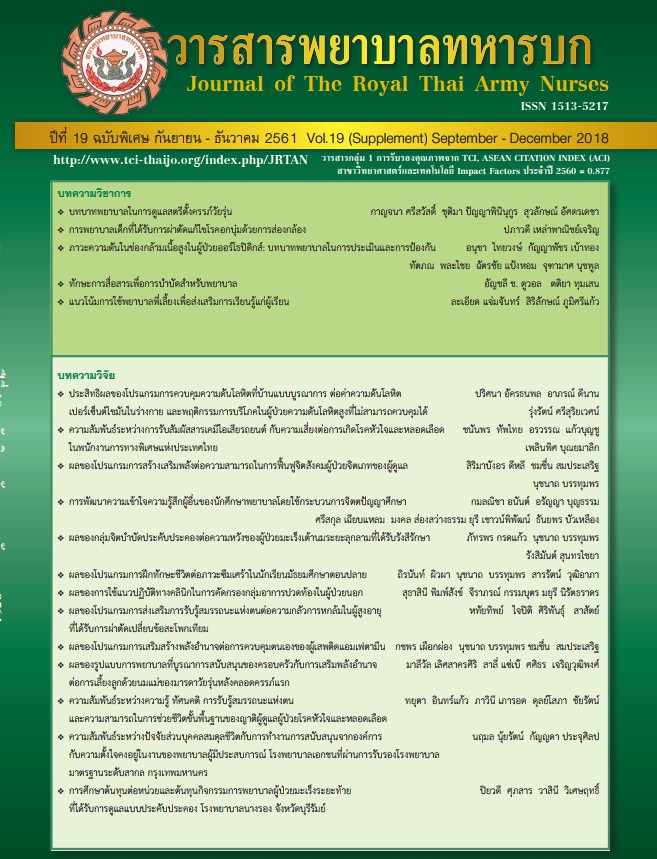The Effect of Sleep Behavioral Modification Program on Insomnia in Heart Failure Patients
Keywords:
Insomnia, Heart failure, Behavioral modification programAbstract
The purpose of this quasi-experimental research was to study the effect of sleep behavioral modification program on insomnia in heart failure patients. Subjects were 40 heart failure patients at the cardiology unit and medical unit of Phramongkutklao Hospital. They were selected by a convenience sampling. The subjects were equally divided into a control group and an experimental group. They were matched in terms of NYHA functional classification and insomnia level. The control group received conventional nursing care while the experimental group received the sleep behavioral modification program comprised of sleep hygiene education, rule of behavioral treatment (sleep restriction and stimulus control) and patients followed sleep schedule. Data collection instruments were the Insomnia Severity Index. The instruments were tested for reliability yielding Cronbach’s alpha coefficients 0.87. The statistical techniques used in data analysis were percentage, mean, and t-test. The research findings were as follows: Post-test score mean of insomnia in an experimental group was significantly lower than those of pre-test score at the .05 level. Post-test score mean of insomnia in the experimental group was significantly lower than those of the control group at the .05 level.
Downloads
References
2. National Institutes of Health State of the Science Conference statement on Manifestations and Management of Chronic Insomnia in Adults, June 13-15, 2005. Sleep. 2005;28(9): 1049-1057.
3. Chimluamg J, Aungsuroch Y, Jitpanya C. Descriptors of Insomnia among Patients with Heart Failure. Medical Association of Thailand Journal. 2017;100(4). (in Thai)
4. Principe-Rodriguez K, Strohl KP, Hadziefendic S, Pina IL. Sleep symptoms and clinical markers of illness in patients with heart failure. Sleep and Breathing. 2005;9(3):127-33.
5. Redeker NS, Jeon S, Muench U, Campbell D, Walsleben J, Rapoport DM. Insomnia symptoms and daytime function in stable heart failure. Sleep. 2010;33(9):1210-6.
6. Redeker NS, Stein S. Characteristics of sleep in patients with stable heart failure versus a comparison group. Heart & lung : The Journal of Critical Care. 2006;35(4):252-61.
7. Kanno Y, Yoshihisa A, Watanabe S, Takiguchi M, Yokokawa T, Sato A, et al. Prognostic Significance of Insomnia in Heart Failure. Circulation Journal. 2016;80:1571-7.
8. Laugsand LE, Strand LB, Platou C, Vatten LJ, Janszky I. Insomnia and the risk of incident heart failure: a population study. European Heart Journal. 2014;35:1382-93.
9. Andrews LK, Coviello J, Hurley E, Rose L, Redeker NS. “I’d eat a bucket of nails if you told me it would help me sleep:” perceptions of insomnia and its treatment in patients with stable heart failure. Heart & lung : The Journal of Critical Care. 2013;42(5):339-45.
10. Tepsuriyanont S. Quality of Life in Heart Failure Patients. Journal of The Royal Thai Army Nurses. 2017;18(1):39-45. (in Thai)
11. Harvey AG. A cognitive theory and therapy for chronic insomnia. Journal of Cognitive Psychotherapy. 2005;19(1):41-59.
12. Troxel WM, Germain A, Buysse DJ. Clinical management of insomnia with brief behavioral treatment (BBTI). Behavioral Sleep Medicine. 2012;10(4):266-79.
13. Harvey AG, Sharpley AL, Ree MJ, Stinson K, Clark DM. An open trial of cognitive therapy for chronic insomnia. Behaviour Research and Therapy. 2007;45(10):2491-501.
14. Burns N, Grove SK. The practice of nursing research : appraisal, synthesis, and generation of evidence. St. Louis, Mo.: Saunders/Elsevier; 2009.
15. Morin CM. Psychological assessment & management. New York: The Guilford Press; 1993.
16. Keawphang P. Relationships between selected factors and insomnia in adult cancer patients: Chulalongkorn University; 2002. (in Thai)
17. Kroenke K, Spitzer RL. The PHQ-9: A new depression diagnostic and severity measure. Psychiatric Annals. 2002;32(9):509-15.
18. Lotrakul M, Sumrithe S, Saipanish R. Reliability and validity of the Thai version of the PHQ-9. BMC Psychiatry. 2008;8:46-53.
19. Lacks P, Rotert M. Knowledge and practice of sleep hygiene techniques in insomniacs and good sleepers. Behaviour Research and Therapy.
1986;24(3):365-8.
20. Morin CM, Vallieres A, Ivers H. Dysfunctional beliefs and attitudes about sleep (DBAS): validation of a brief version (DBAS-16). Sleep. 2007;30(11):1547-54.
21. Gliem JA, Gliem RR. Calculating, interpreting, and reporting cronbach’s alpha reliability coefficient for likert-type scales. In Midwest Research to Practice Conference in Adult 2003. 82-8 p.
22. Aunjitsakul W, Udomratn P. Cognitive Behavioral Therapy for insomnia. Journal of the Phychaiatric Association of Thailand. 2016;61(1):89-106. (in Thai)
Downloads
Published
How to Cite
Issue
Section
License
บทความหรือข้อคิดเห็นใดใดที่ปรากฏในวารสารพยาบาลทหารบกเป็นวรรณกรรมของผู้เขียน ซึ่งบรรณาธิการหรือสมาคมพยาบาลทหารบก ไม่จำเป็นต้องเห็นด้วย
บทความที่ได้รับการตีพิมพ์เป็นลิขสิทธิ์ของวารสารพยาบาลทหารบก
The ideas and opinions expressed in the Journal of The Royal Thai Army Nurses are those of the authors and not necessarily those
of the editor or Royal Thai Army Nurses Association.






